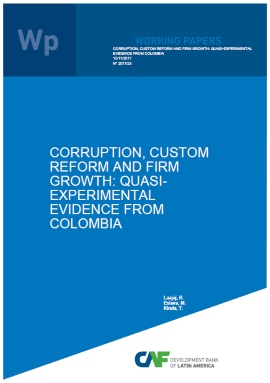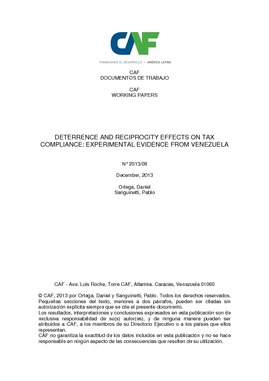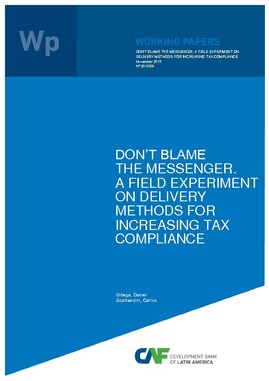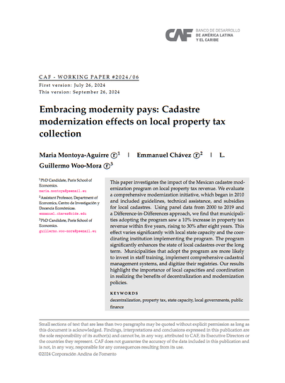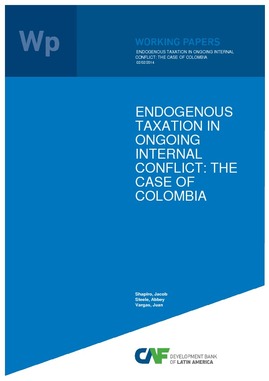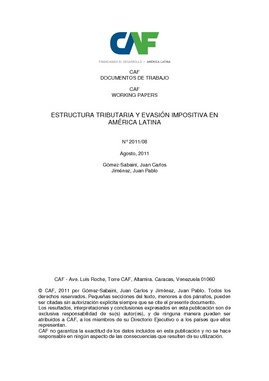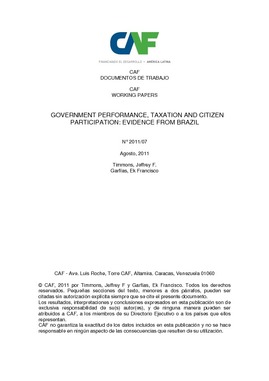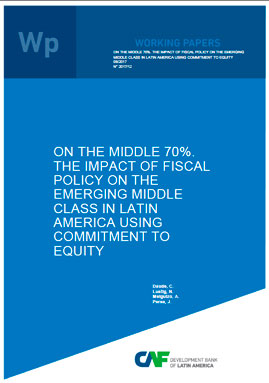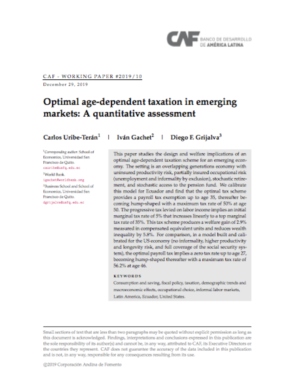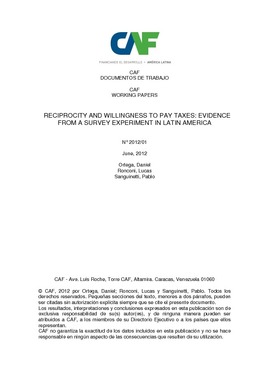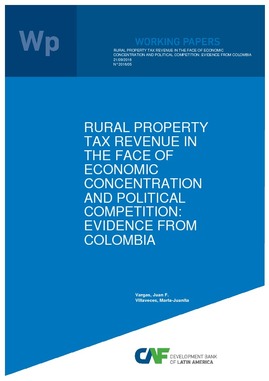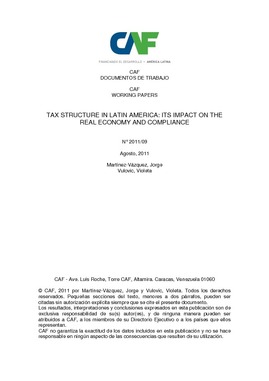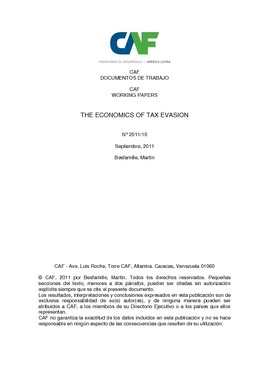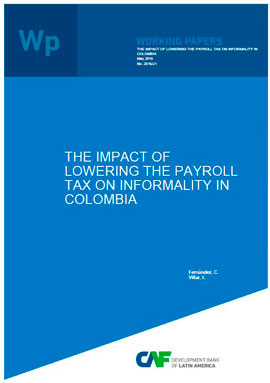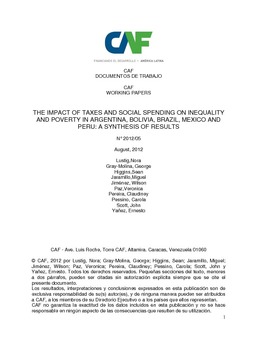Listar6.1 Documentos de trabajo en investigación socioeconómica por tema "Impuestos"
Mostrando ítems 1-17 de 17
-
Corruption, Custom Reform and Firm Growth: Quasi-Experimental Evidence from Colombia
(CAF; Buenos Aires, 2017-11-15)Customs are often prone to corruption because it concentrates a lot of discretionary power in the hand of custom agents who take decisions with high economic stakes for the firms, providing an opportunity for custom agents ... -
Deterrence and reciprocity effects on tax compliance: experimental evidence from Venezuela
(CAF; Caracas, 2013)A recent debate on tax compliance asks whether enforcement mechanisms can be complemented, or even substituted by appeals to the taxpayer’s tax morality: his or her intrinsic willingness to pay taxes, motivated by purely ... -
Don’t blame the Messenger. A Field Experiment on Delivery Methods for Increasing Tax Compliance
(CAF; Caracas, 2015-11)The effect of different delivery mechanisms for increasing tax compliance has not been evaluated so far. This study conducts a field experiment in Colombia that varies the way the National Tax Agency contacts taxpayers on ... -
Effect of Socio-Economic Stratification on House Value in Bogotá
(CAF; Bogotá, 2016-12-24)This paper investigates the impact of urban fiscal policies on housing value. We use a focalization system in Bogotá where certain subsidies and taxes are targeted based on a classification of houses according to external ... -
Embracing modernity pays: Cadastre modernization effects on local property tax collection
(2024-09-26)This paper investigates the impact of the Mexican cadastre modernization program on local property tax revenue. We evaluate a comprehensive modernization initiative, which began in 2010 and included guidelines, technical ... -
Endogenous Taxation in Ongoing Internal Conflict: The Case of Colombia
(CAF, 2014-02)Recent empirical evidence at the cross-country and subnational levels suggests that internal conflicts harm state capacity and tax performance. On the face of it this is odd: internal conflict should create strong incentives ... -
Estructura tributaria y evasión impositiva en América Latina
(CAF; Caracas, 2011)Este informe estudia la evolución y las características del nivel y la estructura de la carga tributaria promedio en la región a través de los últimos veinte años, buscando identificar las diferencias relevantes entre ... -
Government performance, taxation and citizen participation: evidence from Brazil
(CAF; Caracas, 2011)Fiscal contract theories of the state hypothesize that government performance affects tax collection and that institutions that foster representation and accountability link taxes and services. These propositions have yet ... -
On the middle 70%. The impact of fiscal policy on the emerging middle class in Latin America using Commitment to Equity
(CAF; Buenos Aires, 2017-08-05)This paper analyzes the effects of indirect and direct taxes, as well as monetary and in-kind transfers on the income distribution in nine Latin American countries applying the CEQ methodology and using household and ... -
Optimal age-dependent taxation in emerging markets: A quantitative assessment
(CAF; Caracas, 2019-12-29)This paper studies the design and welfare implications of an optimal age-dependent taxation scheme for an emerging economy. The setting is an overlapping generations economy with uninsured productivity risk, partially ... -
Reciprocity and willingness to pay taxes: evidence from a survey experiment in Latin America
(CAF; Caracas, 2012)We provide the first experimental attempt at measuring reciprocity in tax collection in developing countries, where enforcement institutions are weak, and where tax rates and in general tax observance is lower. In a household ... -
Rural Property Tax Revenue in the Face of Economic Concentration and Political Competition: Evidence from Colombia
(CAF; Caracas, 2016-09-21)We study the relationship between two sources of political power and property tax revenues in contemporary rural Colombia. First, de jure political power is the extent to which local political elites can capture the public ... -
State formation, tax structures and mineral abundance Chile and Peru, 1850-1930s
(CAF; Caracas, 2010)The paper assesses the impact of natural resource abundance on state formation by looking at how tax structures responded to booming periods in the early ages of the Chilean and Peruvian republic, 1850-1930s. The paper ... -
Tax structure in Latin America: its impact on the real economy and compliance
(CAF; Caracas, 2011)In this paper we review the structure of tax systems in Latin America and analyze their impact on the real economy-- economic growth, macro-economic stability, income redistribution and foreign direct investment--, and on ... -
The economics of tax evasion
(CAF; Caracas, 2011)This paper begins by reviewing the problem of tax evasion measurement. Based on available data, I conclude that this problem is far from being negligible, both for developed and developing countries. I also present in more ... -
The impact of lowering the payroll tax on informality in Colombia
(Caracas, 2016)The Colombian government recently reformed the tax law by reducing payroll contributions from 29.5% to 16% and substituting them with a profit tax. The law was passed in December 2012, and two years later the informality ... -
The impact of taxes and social spending on inequality and poverty in Argentina, Bolivia, Brazil, Mexico and Peru: a synthesis of results
(CAF; Caracas, 2012)We apply a standard tax and benefit incidence analysis to estimate the impact on inequality and poverty of direct taxes, indirect taxes and subsidies, and social spending (cash and food transfers and in-kind transfers in ...


